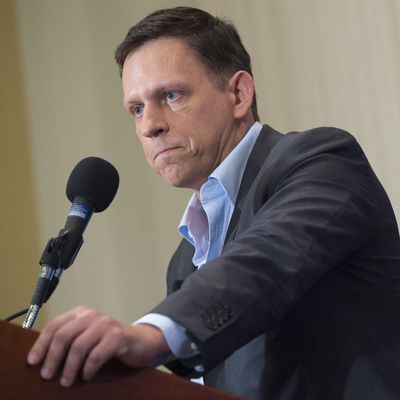
In 2009, the libertarian billionaire Peter Thiel wrote a short essay for the Cato Institute’s online journal lamenting, “I no longer believe that freedom and democracy are compatible” because “capitalism simply is not that popular with the crowd.” In the essay, Thiel used these observations to launch into a discussion of starting space colonies or private islands where his small-government vision could prevail. But in the current election cycle, he channeled his beliefs into more practical measures, like delivering a speech endorsing Donald Trump at the Republican National Convention in Cleveland, donating more than a million dollars to elect him, and then defending his support for Trump in another speech today at the National Press Club.
Thiel demonstrates one of the major points in my argument about Trump and the rising authoritarianism of the Republican Party: Its behavior arises out of the growing conviction on the right that conservative economic policies no longer stand much chance of winning democratic majorities. The conventional wisdom sees the party as deeply and irrevocably split between its elite Paul Ryan wing and its Trump wing, probably headed toward civil war. My argument holds that the two wings are closely related. Ryan, Grover Norquist, the Wall Street Journal editorial page, the Koch brothers, and other advocates of the traditional party economic agenda have given him at least muted support. Economic libertarianism contains an intrinsic fear of the majority using the ballot box to redistribute resources from the few to the many. That terror is the basis of Ayn Rand’s novels, which inspired Paul Ryan’s career in public life.
To be sure, many libertarians oppose Trump. The most anti-Trump libertarians are the ones who place the least emphasis on economic policy — who are, naturally, also the libertarians with the weakest attachment to Republican politics in the first place.
My argument that the party is lurching toward a synthesis of libertarian (economic) ends harnessed to authoritarian means may sound at first blush like a contradiction. But Thiel is a helpful illustration of the reality that right-wing libertarianism is far more comfortable with authoritarianism than you might presume.






























